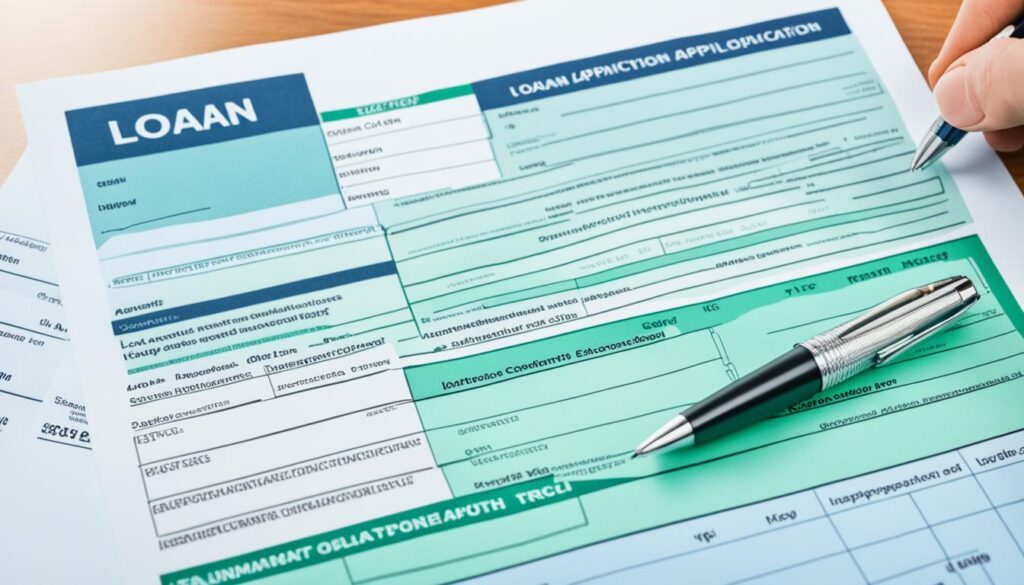Secrets of Secured loans have long been a popular financing option for borrowers looking to access funds by offering collateral. These loans require borrowers to provide valuable assets like a car or a home, ensuring that lenders have security if the borrower defaults. By exploring the secrets of secured loans, borrowers can enjoy lower interest rates, favorable loan terms, and increased chances of approval.
One key factor in securing a loan is the borrower’s credit score. Lenders use credit scores to assess creditworthiness and determine the interest rates and loan terms they are willing to offer. It is crucial for borrowers to have a good credit history and a high credit score to increase their chances of securing a loan. By improving their credit and regularly reviewing their credit report, borrowers can enhance their creditworthiness and unlock better loan opportunities.
Finding the right lender is also critical when applying for a secured loan. Different lenders offer varying loan options and interest rates, so it’s essential to shop around and compare offers. Traditional banks, online lenders, and credit unions all have secured loan options available. Look for lenders that specialize in secured loans and offer favorable interest rates and flexible repayment terms. Gathering loan offers from different lenders allows borrowers to make an informed decision and secure the best loan terms possible.
One of the significant benefits of secured loans is the ability to access lower interest rates and more substantial loan amounts compared to unsecured loans. The collateral provided gives lenders confidence in the borrower’s ability to repay the loan, resulting in better loan offers and increased borrowing power. Secured loans often come with more favorable loan terms, such as longer repayment periods and lower monthly payments, making them an attractive option for borrowers.
Also Read : Taking Control Of Your Finances: The Consolidation Loan Solution
When applying for a secured loan, careful preparation is crucial. Borrowers should determine the type of loan they need, gather all necessary documents, complete the loan application, and submit it to the lender of their choice. If approved, thorough review of the loan contract is essential before signing to ensure understanding of the terms and conditions. Providing accurate information and demonstrating the ability to repay the loan are crucial to increase the chances of approval.
To secure a loan successfully, borrowers should follow some tips and best practices. These include assessing their financial situation to ensure the ability to repay the loan, maintaining financial discipline, and making timely loan payments. Repaying the loan on time not only helps to build a positive credit history but also improves the credit score. By following these tips, borrowers can increase their chances of securing a loan and enjoy the benefits of secure financing.
While secured loans offer many benefits, borrowers must also understand the risks involved. Defaulting on the loan could result in the loss of the collateral provided. It is important to carefully consider the financial discipline needed to repay the loan before entering into a secured loan agreement. Lenders conduct risk assessments to determine the borrower’s ability to repay the loan and mitigate potential losses.
Secured loans can be used for various purposes like personal expenses, home purchases or renovations, business investments, or buying a car. Understanding the different loan options available helps borrowers choose the right secured loan for their specific needs.
Also Read : Driving Innovation: Accessing Small Business Loan Opportunities
Securing favorable interest rates on a secured loan requires attention to several factors. Monitoring market conditions, maintaining a good credit history, and ensuring a low debt-to-income ratio can help borrowers secure lower interest rates. The value and type of collateral provided may also affect the interest rate offered. Understanding these secrets can help borrowers negotiate better loan terms and save money on interest payments.
The power of using collateral in secured loans cannot be understated. Collateral gives lenders security and allows borrowers to access better loan terms. The value of the collateral determines the loan amount and interest rates offered. Homeowners, for example, can utilize the equity in their homes through home equity loans or lines of credit, further maximizing their borrowing potential.
To secure a loan, borrowers must meet certain requirements, including having a good credit report, demonstrating the ability to repay the loan, and meeting the lender’s loan terms. Meeting these requirements increases the chances of loan approval and allows borrowers to enjoy the benefits of secured financing.
In conclusion, by understanding the secrets of secured loans, borrowers can unlock better loan terms, lower interest rates, and increased borrowing power. From managing their credit score to finding the right lender, borrowers can make informed decisions and secure loans that suit their needs. Armed with these insider secrets, borrowers can achieve their financial goals and enjoy the benefits of secured financing.
Also Read : Exploring The World Of Payday Loans: Insights And Guidance
Key Takeaways:
- Secured loans require borrowers to provide collateral and offer benefits like lower interest rates and more substantial loan amounts.
- A good credit score is crucial for securing a loan, as lenders use credit scores to assess creditworthiness.
- Finding the right lender is essential, as different lenders offer varying loan options and interest rates.
- Borrowers should carefully prepare their loan application and review the loan contract before signing.
- Maintaining financial discipline and repaying the loan on time can increase the chances of loan approval and improve credit scores.
Also Read : Cracking The Code Of Mortgage Loans: Expert Strategies
The Importance of Credit Scores in Secured Loans
When it comes to securing a loan, your credit score holds significant importance. Lenders rely on credit scores to assess your creditworthiness and determine the interest rates and loan terms they are willing to offer. Having a good credit history and a high credit score can greatly increase your chances of successfully obtaining a secured loan.
A credit score is a three-digit number that represents your creditworthiness based on your credit history. It reflects your ability to manage debt and make loan payments on time. Lenders use credit scores to evaluate the level of risk involved in granting you a loan.
Higher credit scores indicate a lower risk for lenders, resulting in more favorable loan terms, such as lower interest rates and higher loan amounts. On the other hand, lower credit scores may lead to higher interest rates or even loan denial.
Also Read : Student Loans Decoded: Essential Information For Borrowers
How Do Lenders Use Credit Scores?
Lenders use credit scores as a tool to assess your creditworthiness and predict your likelihood of repaying the loan. They take into account factors such as your payment history, amounts owed, length of credit history, types of credit used, and new credit inquiries. By analyzing these factors, lenders can make informed decisions regarding your loan application.
Improving your credit score can increase your chances of securing a loan and obtaining more favorable terms from lenders. Regularly reviewing your credit report can help you identify any errors or discrepancies that may be negatively impacting your score. By addressing these issues and maintaining good credit habits, you can enhance your creditworthiness and unlock better loan opportunities.
| Benefits of Improving Your Credit | How to Improve Your Credit Score |
|---|---|
|
|
By understanding the importance of credit scores in securing a loan and taking steps to improve your creditworthiness, you can increase your chances of obtaining a secured loan with attractive interest rates and beneficial terms.
Finding the Right Lender for Secured Loans
When applying for a secured loan, finding the right lender is crucial. Different lenders offer a variety of loan options and interest rates, making it essential to explore and compare different offers. In your search for the perfect lender, consider traditional banks, online lenders, and credit unions. Each type of lender may have its own advantages and disadvantages, so it’s important to evaluate your options carefully.
When assessing lenders, look for those that specialize in secured loans and offer favorable interest rates and flexible repayment terms. A lender experienced in secured financing will better understand the unique requirements of this type of loan, providing you with tailored solutions. Furthermore, favorable interest rates will help you save money over the life of the loan.
Tip: Gathering loan offers from different lenders allows you to make an informed decision and secure the best loan terms possible. Remember, the interest rate is not the only factor to consider; read the loan agreement thoroughly and assess the lender’s reputation and customer service.
| Lender | Loan Options | Interest Rates |
|---|---|---|
| ABC Bank | Home Equity Loans, Personal Loans | Starting from 4.5% |
| XYZ Credit Union | Secured Business Loans, Auto Loans | Starting from 3.75% |
| Online Lender | Collateral Line of Credit, Specialized Loans | Starting from 5.25% |
“The right lender can make all the difference when it comes to securing a loan. Don’t settle for the first offer you receive. Take the time to research and compare lenders, and you’ll increase your chances of finding the most favorable loan terms.” – Financial Expert
By taking the time to find the right lender for your secured loan, you’ll ensure that you receive the best loan options and favorable interest rates. Remember to consider the loan terms, customer service, and overall reputation of the lenders you explore. With a well-informed decision, you’ll be confident in your choice and positively impact your financial future.

The Benefits of Secured Loans
Secured loans offer numerous advantages over unsecured loans. By providing collateral, borrowers can secure lower interest rates and access larger loan amounts. Additionally, secured loans often come with more favorable loan terms such as longer repayment periods and lower monthly payments. The collateral provided gives lenders confidence in the borrower’s ability to repay the loan, resulting in better loan offers and increased borrowing power.
One of the primary benefits of secured loans is the opportunity to enjoy lower interest rates. Because the borrower pledges collateral, lenders face less risk compared to unsecured loans. This reduced risk allows lenders to offer lower interest rates, resulting in significant cost savings for borrowers over the life of the loan.
Secured loans also provide borrowers with the ability to access larger loan amounts. By offering collateral, borrowers demonstrate their commitment to repaying the loan, which often leads to loan approvals for larger amounts. Whether it’s financing a major home renovation project or funding a new business venture, secured loans can provide the necessary funds to turn dreams into reality.
Furthermore, secured loans frequently come with more favorable loan terms. Lenders recognize the added security provided by collateral, which allows them to offer more flexible repayment periods and lower monthly payments. This can provide borrowers with greater financial stability and manageable loan obligations.
The collateral provided in secured loans gives lenders peace of mind regarding the borrower’s ability to repay the loan. By having an asset at stake, borrowers are more likely to demonstrate financial responsibility and prioritize loan repayment. Lenders are more willing to provide better loan offers and loan amounts when they have confidence in the borrower’s ability to fulfill their financial obligations.
In summary, secured loans offer borrowers lower interest rates, access to larger loan amounts, more favorable loan terms, and increased confidence from lenders. The ability to provide collateral gives borrowers a unique advantage when seeking financing. Whether it’s for a home, a car, or a business venture, secured loans can provide the financial support needed to achieve goals and secure a stable financial future.

| Advantages of Secured Loans |
|---|
| Lower interest rates |
| Larger loan amounts |
| More favorable loan terms |
| Increased borrowing power |
| Borrower confidence |
How to Apply for a Secured Loan
Applying for a secured loan can be a straightforward process if you take the right steps. Whether you’re considering a mortgage, home equity loan, or a business loan, here’s a guide to help you navigate through the loan application process.
Determining the Loan Type
The first step in applying for a secured loan is to determine the type of loan that suits your needs. If you’re looking to purchase a new home or refinance your existing mortgage, a mortgage loan is the best option. On the other hand, a home equity loan allows you to tap into the equity of your home. If you require financing for your business, a business loan is the right choice. Identifying the loan type sets the foundation for your loan application.
Gathering Necessary Documents
Before submitting a loan application, gather all the necessary documents to streamline the process. These include proof of identity, such as your driver’s license or passport, proof of income, such as pay stubs or tax returns, and documentation of the collateral’s value, such as property appraisals or vehicle evaluations. These documents help lenders assess your eligibility and determine the loan amount and interest rates.
Completing the Loan Application
Once you have all the required documents, complete the loan application. Provide accurate information and answer all the questions truthfully. Remember to include details about the collateral you’re providing to secure the loan. Be prepared to provide additional information if requested by the lender for a thorough assessment of your loan application.
Reviewing the Loan Contract
If your loan application gets approved, it is vital to review the loan contract carefully before signing. Pay close attention to the terms and conditions, including the interest rate, repayment schedule, and any additional fees or penalties. Ensure that you fully understand the obligations and responsibilities outlined in the contract, as this will help you determine if the loan aligns with your financial goals.
By carefully following these steps and providing accurate information, you can increase your chances of securing a loan. Remember, securing a loan requires demonstrating your ability to repay and providing collateral to mitigate risk for the lender. If you have any questions or concerns during the application process, don’t hesitate to seek guidance from your chosen lender.

| Loan Type | Requirements |
|---|---|
| Mortgage Loan | Proof of identity, income, property appraisal |
| Home Equity Loan | Proof of identity, income, home equity value |
| Business Loan | Proof of identity, income, business financial statements |
Secured Loan Tips and Best Practices
When it comes to securing a loan, there are insider secrets to success. By following these tips and best practices, borrowers can increase their chances of obtaining a secured loan and enjoy the benefits it offers.
1. Assess Your Ability to Repay the Loan
Before applying for a secured loan, it’s crucial to assess your financial situation and ensure that you have the ability to repay the loan. Consider your income, expenses, and budgeting capabilities to determine if you can comfortably meet the loan obligations.
2. Maintain Financial Discipline
Financial discipline is key to successfully managing a secured loan. Make timely loan payments and avoid accumulating unnecessary debt. By staying on top of your financial obligations, you demonstrate your ability to handle credit responsibly, which lenders value.
3. Repay the Loan on Time
One of the most important factors in securing a loan is repaying it on time. Timely payments not only prevent late fees and penalties but also contribute to building a positive credit history. A positive credit history can improve your credit score, making it easier to secure future loans.
“Paying your loan on time is crucial for building a positive credit history and improving your credit score.”
4. Consider Collateral Carefully
When securing a loan, carefully consider the collateral you are offering. The value and type of collateral can impact the interest rates and loan terms you receive. Choose collateral that is valuable and easily evaluated by lenders, such as a home or car.
5. Shop Around for the Best Loan Offers
Don’t settle for the first loan offer you receive. Instead, take the time to shop around and compare different lenders’ offers. Look for lenders that specialize in secured loans and offer competitive interest rates and favorable loan terms.
6. Seek Professional Advice if Needed
If you find the process of securing a loan overwhelming or confusing, don’t hesitate to seek professional advice. Financial advisors or loan experts can provide valuable insights and guidance to help you make informed decisions and secure the best loan for your needs.

Understanding the Risks of Secured Loans
While secured loans offer numerous benefits, borrowers must also be aware of the potential risks involved. It is crucial to understand these risks before entering into a secured loan agreement.
One significant risk of secured loans is the possibility of defaulting on the loan. If a borrower fails to make timely loan payments, they risk losing the collateral provided as security for the loan. This collateral, such as a car or a home, serves as a guarantee for the lender. In the event of default, the lender has the right to seize and sell the collateral to recover the outstanding loan amount.
“Defaulting on a secured loan can have severe consequences, potentially leading to the loss of valuable assets.”
Therefore, borrowers should carefully evaluate their financial discipline and ability to repay the loan before committing to a secured loan. Maintaining good financial discipline, including budgeting, prioritizing loan payments, and practicing responsible financial habits, is essential to minimize the risk of default.
Lenders also conduct risk assessments to determine a borrower’s ability to repay the loan. They evaluate factors such as credit history, income stability, and debt-to-income ratio. This risk assessment allows lenders to gauge the risk of default and adjust the loan terms, including interest rates and repayment periods, accordingly.
By understanding the risks associated with secured loans, borrowers can make informed decisions and take necessary precautions to avoid financial difficulties in the future.

It is crucial to assess your financial situation, consider the potential risks, and ensure that you have the necessary financial discipline to meet your loan obligations. By doing so, you can mitigate the risks involved and make the most of the benefits that secured loans offer.
Using Secured Loans for Various Purposes
Secured loans provide borrowers with the flexibility to finance a wide range of expenses. Whether you’re looking to fund a personal project, purchase a home, grow your business, or buy a new car, a secured loan can be the solution you need. By leveraging the value of collateral, such as a property or vehicle, you can access funds at favorable interest rates and favorable loan terms.
Let’s explore some of the common purposes for which secured loans are used:
1. Personal Loan
A secured personal loan can be a great option for financing personal expenses such as home renovations, medical bills, or debt consolidation. By providing collateral, you can qualify for a higher loan amount and enjoy competitive interest rates. This can make it easier to manage your finances and achieve your personal goals without straining your budget.
2. Home Loan
For many individuals and families, homeownership is a lifelong dream. Secured home loans, including mortgages and home equity loans, offer an opportunity to turn this dream into a reality. Whether you’re purchasing a new home or renovating your current one, securing a loan with your home as collateral can provide access to substantial funds and more favorable loan terms.
3. Business Loan
If you’re a business owner, a secured business loan can fuel the growth and expansion of your company. By using collateral, such as commercial property or equipment, you can secure the funds needed to invest in your business. Whether you’re launching a new venture, expanding operations, or financing equipment purchases, a secured business loan can provide the capital you require.
4. Car Loan
When it comes to buying a new or used car, a secured car loan is a popular financing option. By using the vehicle as collateral, you can secure a loan at competitive interest rates and favorable terms. This can help you drive off the lot with your dream car while also benefiting from manageable monthly payments.
5. Debt Consolidation
If you’re struggling with multiple debts and looking for a way to simplify your finances, a secured debt consolidation loan may be the answer. By combining your outstanding debts into one single loan, you can streamline your repayments and potentially secure a lower interest rate. This can help you regain control of your finances and work towards becoming debt-free.
Remember, when considering a secured loan for any purpose, carefully evaluate your financial situation, assess the risks involved, and choose a reputable lender that offers favorable loan terms. By making informed decisions and leveraging the power of secured loans, you can achieve your financial goals effectively.
| Loan Type | Purpose | Collateral |
|---|---|---|
| Personal Loan | Home renovations, medical bills, debt consolidation | Varies (can include home equity, vehicle, or other valuable assets) |
| Home Loan | Home purchase, property renovations | Property (house, condominium, etc.) |
| Business Loan | Business expansion, equipment purchase, working capital | Commercial property, business assets |
| Car Loan | Vehicle purchase | New or used vehicle being financed |
| Debt Consolidation | Consolidating multiple debts into one | Varies (can include home equity or other valuable assets) |
The Secrets to Securing Favorable Interest Rates
When it comes to securing a secured loan, favorable interest rates can make a significant difference in the overall cost of borrowing. By understanding the secrets to securing lower interest rates, borrowers can save money and make their loan more affordable in the long run.
Monitoring Market Conditions
Market conditions play a crucial role in determining interest rates for secured loans. **Borrowers** should closely monitor interest rate trends before applying for a loan. Keep an eye on economic indicators and financial news to stay informed about any potential changes in interest rates. By being aware of market conditions, borrowers can time their loan application to secure the most favorable interest rates available.
Maintaining a Good Credit History
Your credit history is another vital factor that impacts the interest rate you can secure on a secured loan. Lenders consider your credit score and credit history as indicators of **creditworthiness**. Maintain a good credit score by paying bills on time, keeping credit card balances low, and avoiding any negative marks on your credit report. A positive credit history demonstrates to lenders that you are a responsible borrower, increasing your chances of obtaining lower interest rates.
Managing Your Debt-to-Income Ratio
Your debt-to-income ratio is the amount of your monthly debt payments compared to your monthly income. Lenders use this ratio to assess your ability to handle additional debt responsibly. By keeping your debt-to-income ratio low, you show lenders that you have sufficient income to make loan payments comfortably. **Lowering** your debt-to-income ratio can help **negotiate** lower interest rates on your secured loan.
Providing Valuable Collateral
The value and type of collateral you provide can also influence the interest rate offered on a secured loan. Collateral provides **security** for the lender, reducing their risk. **Valuable** collateral, such as a home or a car, can help **negotiate** lower interest rates. Lenders typically consider the collateral’s market value, condition, and **liquidity** when determining the interest rate on a secured loan.
The key to securing favorable interest rates on a secured loan lies in understanding the market conditions, maintaining a good credit history, managing your debt-to-income ratio, and providing valuable collateral.
By following these secrets, borrowers can negotiate better loan terms and save money on interest payments. Securing a secured loan with lower interest rates means more affordable monthly payments and greater **financial freedom**.
The Power of Using Collateral in Secured Loans
Collateral plays a significant role in secured loans. By providing collateral, borrowers can gain access to better loan terms and maximize their borrowing potential. Whether it’s a valuable asset like a home or a car, offering collateral gives lenders the security they need to offer favorable loan conditions.
When a borrower provides collateral for a secured loan, the lender can use it to recover the loan amount if the borrower defaults. This reduces the lender’s risk and allows them to offer better interest rates and more substantial loan amounts. The value of the collateral determines the loan amount and the interest rates offered.
One popular form of secured loan that utilizes collateral is a home equity loan. If you own a home, you can tap into the equity built up in your property to secure a loan. This type of loan is often used for home renovations, debt consolidation, or other significant expenses. It allows homeowners to unlock the value of their property and access funds at a lower interest rate compared to other forms of borrowing.
Also Read:- Unlock Funds Fast with a Personal Loan
Another option for utilizing the equity in a home is a line of credit. A home equity line of credit (HELOC) provides borrowers with a revolving line of credit based on the equity in their home. It allows homeowners to access funds as needed and only pay interest on the amount used. This flexibility can be advantageous for ongoing projects or expenses that may arise over time.
Understanding the power of using collateral in secured loans is essential for borrowers seeking favorable loan options. Whether it’s using your home as collateral or offering another valuable asset, collateral gives lenders confidence and allows borrowers to secure better loan terms. The ability to access lower interest rates and higher loan amounts can make a significant difference when financing major expenses or consolidating higher-interest debt.
Benefits of Using Collateral in Secured Loans:
- Access to better loan terms
- Lower interest rates
- Higher loan amounts
- Favorable repayment terms
- Ability to tap into the value of assets
Key Requirements for Securing a Loan
Securing a loan successfully requires borrowers to meet specific requirements. Lenders evaluate the borrower’s credit report to assess their credit history and creditworthiness, making it a crucial factor in loan approval. Demonstrating the ability to repay the loan is equally important as lenders want assurance that the borrower can fulfill their loan obligations. By meeting these key requirements, borrowers increase their chances of loan approval and gain access to the benefits of secured financing.
Conclusion
Secured loans offer borrowers the secrets to securing favorable loan terms, lower interest rates, and increased borrowing power. By understanding the requirements, risks, and benefits of secured loans, borrowers can confidently make informed decisions that align with their financial goals. One key aspect to consider is credit score management, as it directly impacts the loan terms and interest rates offered. Taking proactive steps to improve creditworthiness can unlock better loan opportunities.
Finding the right lender is another crucial factor in securing a loan. By exploring various lenders and comparing loan offers, borrowers can identify favorable interest rates and flexible repayment options. It’s essential to choose a lender who specializes in secured loans and understands the unique needs of borrowers seeking secured financing.
With a comprehensive understanding of secured loans, borrowers can navigate the loan landscape with confidence. Armed with the insider secrets to secure loans, individuals can unlock the full potential of secured financing, enjoy lower interest rates, and reap the numerous benefits that come with understanding secured loans.
FAQ
Q: What is a secured loan?
A: A secured loan is a type of loan that is backed by collateral, such as a car or a home, which reduces the risk for the lender.
Q: How is a secured loan different from an unsecured loan?
A: A secured loan requires collateral to back the loan, while an unsecured loan does not require any collateral and is based on the borrower’s creditworthiness.
Q: How can securing a home loan help me buy a home?
A: By securing a home loan, you can borrow money to purchase a home by using the property as collateral, which can lead to lower interest rates.
Q: What are the benefits of unlocking the secrets of secured loans?
A: Understanding secured loans can help you find the best loan options, secure lower interest rates, and improve your chances of loan approval.
Q: How can a secured loan improve my credit?
A: Making timely payments on a secured loan can help improve your credit score, as it shows responsible borrowing and repayment habits.
Q: What is the role of federal credit in securing a personal loan?
A: Federal credit can provide guidelines and regulations for lenders offering secured loans, ensuring fair practices and consumer protection.
Q: What factors can result in lower rates on a secured loan?
A: Factors such as a strong credit history, a low debt-to-income ratio, and valuable collateral can result in lower interest rates on secured loans.
